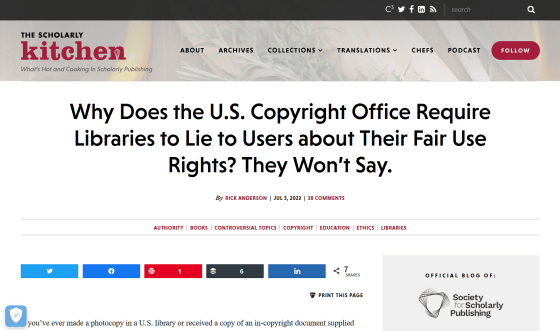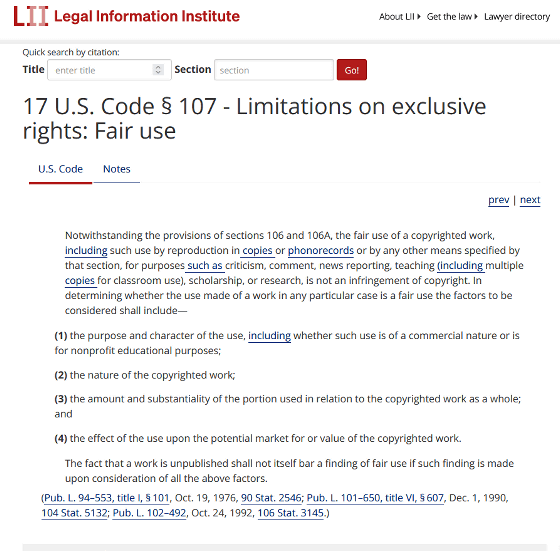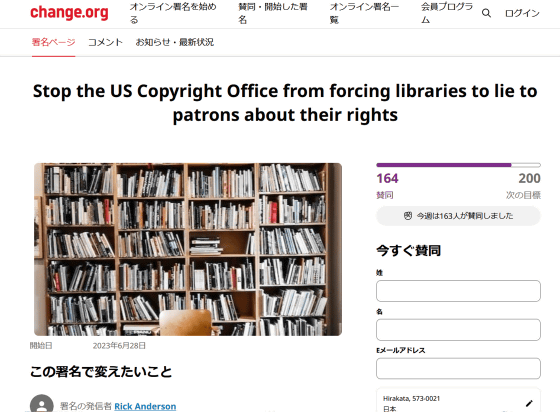``The American Copyright Office requires library users to lie about fair use''

Why Does the US Copyright Office Require Libraries to Lie to Users about Their Fair Use Rights? They Won't Say. - The Scholarly Kitchen
https://scholarlykitchen.sspnet.org/2023/07/05/why-does-the-us-copyright-office-require-libraries-to-lie-to-users-about-their-fair-use-rights- they-won't-say/

In general, the permission of the copyright holder is required to use copyrighted content, but if the use is deemed fair, there is an exception to copyright protection as 'fair use.' Accepted. Fair use in the United States is governed by Title 17, United States Code, Section 107 .
Section 107 states that 'notwithstanding the provisions of Sections 106 and 106A (which state exclusive rights to copyright), criticism, comment, news reporting, teaching (including multiple copies for teacher use), academic Fair use, including reproduction by photocopy or phonorecord, for purposes such as research, or use by any other means specified in that section, does not constitute an infringement of copyright.'

However, when a user copies a book or document in an American library, the following notification will be given.
The copyright laws of the United States (Chapter 17, United States Code) govern the making of copies and other reproductions of copyrighted material.
Under certain conditions specified by law, libraries and archives are permitted to provide copies and other byproducts. One of these specified conditions is that copies or reproductions shall not be used 'for any purpose other than private research, academic or research purposes.' If you request a copy or copy for purposes beyond 'fair use', or if you later use it for those purposes, you may be held liable for copyright infringement.
The Institution reserves the right to refuse a photocopy request if it determines that fulfillment of the photocopy request violates copyright law.
Reading this notice as it is, despite the fact that the scope of fair use stipulated in Article 107 is 'criticism, comment, news reporting, education, scholarship, and research,' for some reason books and other items other than libraries and archives are used. If you copy the literature, the scope will be limited to 'private research, academic research, and research.' However, Anderson points out that the notice issued by the library is problematic and misrepresents users.

This notice is primarily based on Title 17, United States Code, Section 108, which provides an exception for copyright infringement in libraries and archives. Article 108 stipulates that when a library or archives copies a work at the request of a user, ``notice a copyright warning in accordance with the requirements set forth by the Registrar of Copyrights (Director of the United States Copyright Office).'' is defined. The notice above is a sentence prescribed by the United States Copyright Office, and the library side has no choice but to comply with it.
The content of section 108 does not affect the scope of fair use set out in section 107, and does not change the scope of fair use permitted to users, whether the place of copying is a library or an archives. yeah. Anderson argues that the notice given to library users should be corrected because it contains false content about the scope of fair use.
Anderson said, ``If you use a library-provided copy of a work in a way that goes beyond the scope of 'private research, scholarship, or research,' and it falls within the scope of the fair use provisions of Section 107, No legal jeopardy.. Again, the language of § 108 is fair use by the owner of the copy, regardless of what the notice provided by the Copyright Office says. The problem is that the Copyright Office, ostensibly under the authority vested in it by statute, requires libraries to provide users with false information about their rights. Although our users are completely free to make fair use of the copies we provide, we do not grant users a small percentage of their rights each time they make or request a copy. I have to tell them that I only have one,' he said.
Mr. Anderson contacted the United States Copyright Office about this matter, but there was no clear answer to the question, and he said he had no intention of amending the fair use notice at present. In order to reform this current situation, Mr. Anderson and others are soliciting signatures from people at the online signature site 'Change.org'.
Campaign Stop the US Copyright Office from forcing libraries to lie to patrons about their rights Change.org
https://www.change.org/p/stop-the-us-copyright-office-from-forcing-libraries-to-lie-to-patrons-about-their-rights

Related Posts:
in Note, Posted by log1h_ik







